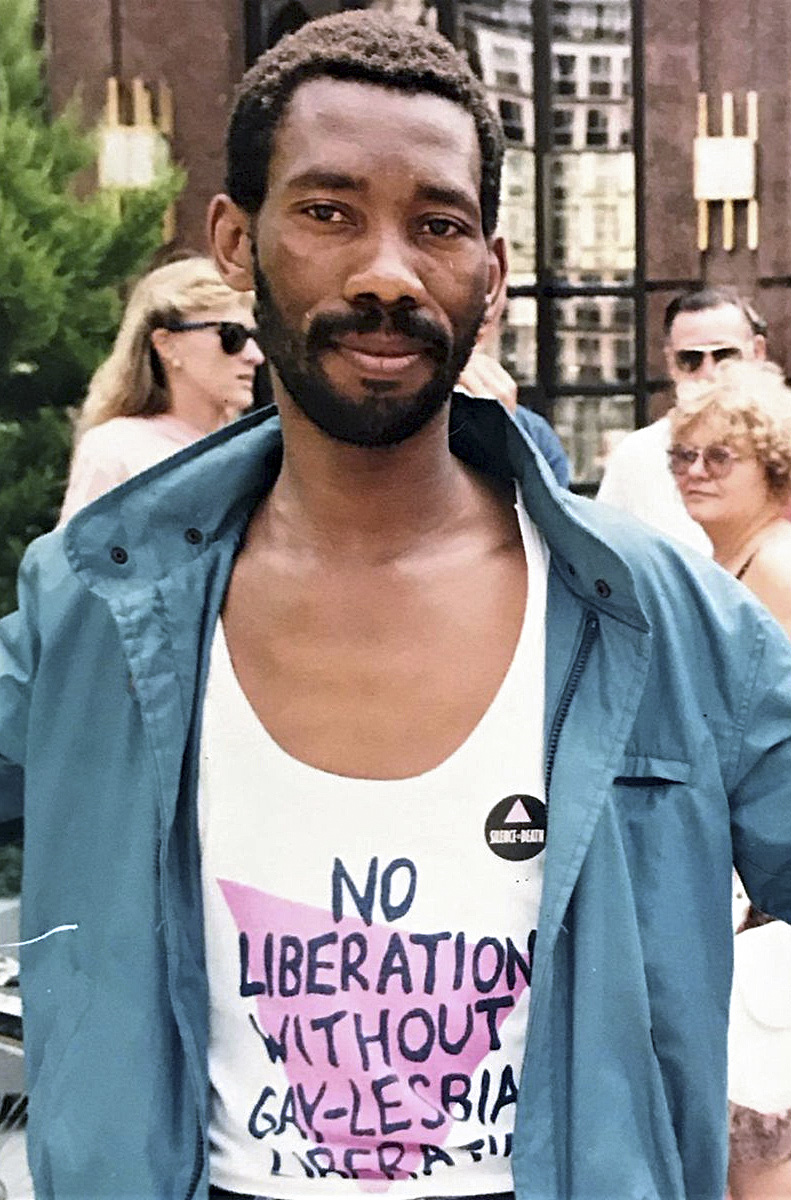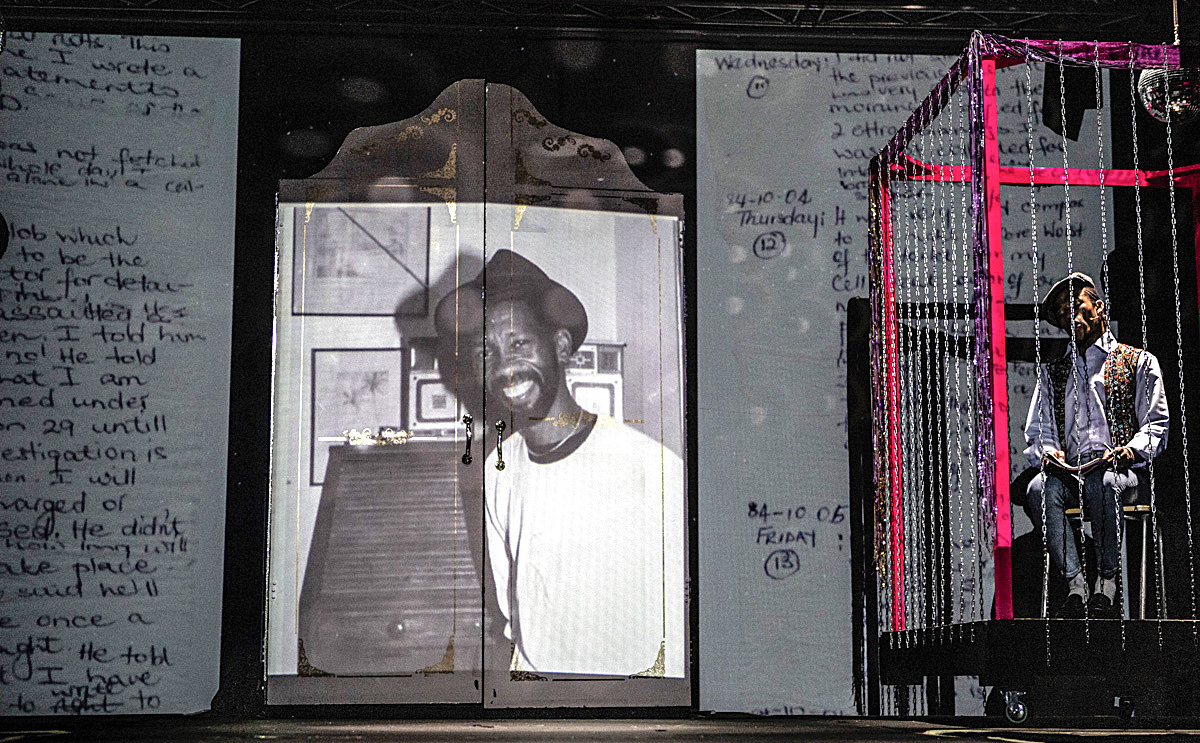Simon Nkoli was a remarkable activist who played a pivotal role in the LGBTQI+ rights movement and the anti-apartheid Struggle. Nkoli’s life story is one that is both tragic and admirable, and his contribution to the development and nurturing of human rights in South Africa cannot be understated.
As we approach the Johannesburg Pride March scheduled for 28 October 2023, it is imperative that we commemorate the life and contribution of Nkoli, who was one of the pioneers of South Africa’s historic first Pride March, in October 1990.

Simon Nkoli, a gay anti-apartheid activist who was imprisoned in the Delmas Treason Trial, Gauteng.
(Photo: GALA Archives)
Born on 26 November 1957, in Soweto, Nkoli grew up under the brutal apartheid regime that was characterised by a government-sanctioned system of racial segregation and oppression. The regime found its ideological impetus in Afrikaner Christian Nationalism which boldly and unashamedly oppressed citizens not only based on race but also in terms of religion, sexuality and gender.
Nkoli’s awakening as an activist began in 1980, when he joined the Congress of South African Students (Cosas) and in 1981 he was elected as the secretary for the Transvaal area. He used this platform to engage in the anti-apartheid Struggle and advocated for equal education opportunities for all, irrespective of race.
Nkoli’s lived experience as a queer black man in apartheid South Africa fuelled his commitment to the struggle for LGBTQI+ rights as a broader component to the realisation of a democratic South Africa that embraced all its citizens regardless of their race or sexuality. The revelation of his sexuality led to many debates within Cosas and the broader Mass Democratic Movement, however the movement embraced him and reaffirmed his position as regional Cosas secretary. He courageously embraced his identity and became a member of the Gay and Lesbian Association of South Africa (Gasa) to reconcile both sides of his activism.
One of the most fundamental victories that Nkoli achieved through GLOW was ensuring that the LGBTQI+ movement participated fully by submitting contributions for South Africa’s Constitution in 1994.
However, it is recorded that he found that Gasa was only concerned with LGBTQI+ rights and preferred to remain neutral and apolitical with regards to the ongoing political tragedy of apartheid. This eventually caused Nkoli to leave the movement in search of an organisation that would embrace both the anti-apartheid and LGBTQI+ struggles.

Tenor Simphiwe Simelane performs in ‘GLOW, the life and trials of Simon Nkoli’ against a backdrop of images of letters that Nkoli smuggled out of prison on toilet paper. (Photo: Mark Lewis / GALA Archives)
In 1984, Nkoli and 21 other activists were arrested and kept in detention for nine months before the state charged them with treason in what became known as the Delmas Treason Trial, which began in 1985. Nkoli was released on bail two years after his arrest, eventually the trial was declared invalid, and he was acquitted on all charges.
Read more in Daily Maverick: Simon Nkoli’s fight for queer rights in South Africa is finally being celebrated – 24 years after he died
Despite the risks and intimidation he faced, Nkoli remained steadfast in his commitment to justice. His involvement in this trial symbolised the intersection of his activism – fighting for freedom from oppression on both the racial and sexual identity fronts.
Relentless in his commitment to the LGBTQI+ rights movement, Nkoli co-founded a new organisation that would champion the cause while embracing and combating the realities of the apartheid state. In 1988, the Gay and Lesbian Organisation of Witwatersrand (GLOW) was founded, with branches also established in the black townships around Johannesburg, a major milestone for the black gay and lesbian community that had been largely underrepresented.
Through GLOW, Nkoli’s advocacy transcended the borders of South Africa and he was elected as the African representative to the International Gay and Lesbian Association Board. He travelled abroad to raise awareness of and garner solidarity for the anti-apartheid Struggle and the discrimination meted out against the LGBTQI+ community in South Africa. Nkoli’s international advocacy managed to rally global support against the brutal and relentless apartheid regime while highlighting the intersectional nature of freedom and human rights.
Africa’s first Pride March
On 13 October 1990, GLOW and its pioneers – Nkoli, Beverley Ditsie, Justice Edwin Cameron, Donné Rundle and Hendrik Pretorius – took a public stand and organised Africa’s first Pride March in Johannesburg. It was attended by about 800 people, some of whom wore masks to hide their identities because they feared discrimination, violence and isolation.
More than 30 years later, Pride marches have become common across South Africa and even in other parts of the continent. The commitment and bravery displayed by Nkoli and his generation laid the path towards building a democratic country where equality and self-determination within the bounds of the law are possible.
One of the most fundamental victories that Nkoli achieved through GLOW was ensuring that the LGBTQI+ movement participated fully by submitting contributions for South Africa’s Constitution in 1994. He and his peers fought tirelessly to ensure that the heinous apartheid “sodomy law” was repealed, which it finally was in 1998.
Nkoli’s life work serves as an everlasting inspiration to marginalised people who continue to fight for equality and justice in an often unjust world.
The combined efforts of ant-apartheid activists who belonged to the LGBTQI+ community ensured that their voice could not be ignored in negotiations. The inclusion of LGBTQI+ rights in the Constitution meant that adoption, work and family rights would be accessible to minority sexualities.
In the later years of his life Nkoli contracted HIV/Aids, but instead of slumping into self-pity, he became an influential HIV/Aids activist. He established an HIV/Aids support group called “Positive African Men” in Johannesburg which became a safe space for black men regardless of their sexual orientation. Sadly, Nkoli died at the age of 41 on 30 November 1998 from an Aids-related illness.
Read more in Daily Maverick: A life resurrected — an opera about Aids and the life of queer activist Simon Nkoli
His legacy has left an indelible mark on the country as a whole; he beat the path for many activists, especially in the Mass Democratic Movement. In the more than 20 years since his passing, the ANC Women’s League has established an LGBTQI+ desk, and the ANC Youth League elects and appoints young queer activists into its structures.
Recently a historic decision was taken to co-opt Steve Letsike to the ANC’s National Executive Committee. These strides are a direct legacy built through sacrifice and hard work by activists like Simon Nkoli who were vocal and dedicated to the Struggle for equality and LGBTQI+ rights.
Nkoli’s life work serves as an everlasting inspiration to marginalised people who continue to fight for equality and justice in an often unjust world. As we prepare for the Johannesburg Pride March, let us honour his unwavering commitment to justice, his fearless advocacy for the marginalised, and his pivotal role in the ongoing pursuit of a more equitable and inclusive world. Simon Nkoli, a true hero of equality, reminds us that the struggle for human rights knows no boundaries.
In his words: “So, when I fight for my freedom I must fight against both oppressions. All those who believe in a democratic South Africa must fight against all oppression, all intolerance, all injustice. With this march, gays and lesbians are entering the struggle for a democratic South Africa where everybody has equal rights and everyone is protected by the law: black and white; men and women, gay and straight.” DM


















I support equal rights for all citizens of South Africa. One group should not be elevated above another in terms of opportunities to live their own lives in accordance with common law.
I’m curious as to what rights homosexuals do not have these days? And why do they need to parade their sexuality in the streets? The homosexuals I know are down to earth people who simply get on with their lives without any fanfare and are not complaining about any limitations on what they can or cannot do.
An eloquent tribute to a remarkable person. A pity therefore … that he did not seem to ‘make it’ to the largest democracy in the world … where believe it or not its ‘supreme court’ refused to engage on the issue of gay marriage … passing the buck to the politicians, who under the manipulative Hindutva leadership, will pander to the most obnoxious elements in that society. The court is a disgrace … but it should be noted it was in a close 3 to 2 vote !